Lions Student Speaking Contest
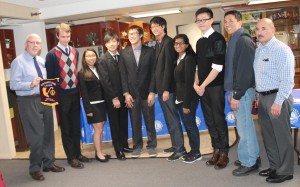
Tom Cody, Alex Hill, Casey Kwan, Brandon Lu, Branden Lim, Winner Evan Cheng, Delags Mylvaganam, Anthony Hu, Kevin Tong and Dr. Larry Odono joined together after the judging of the contest. The students were from Mark Keppel and Alhambra High Schools.
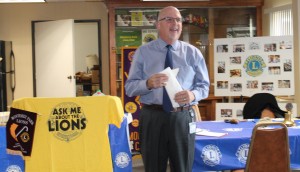
Tom Cody welcomed the students, judges and guests to their February 7th held in the Lions Manor in Monterey Park. He invited everyone to enjoy the luncheon.
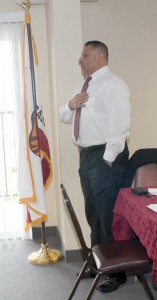
Ben Herrera led the flag salute at the beginning of the meeting.
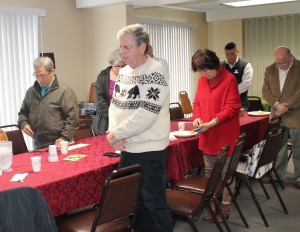
Dennis Windschesspe led the invocation.
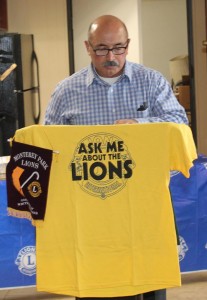
Dr. Larry Odona introduced the topic “Is the Right to Privacy a Threat to our National Security?” He advised the speakers and the audience the rules of the contest.
He then called each speaker to the podium who was not introduced until after the contest.
These are some of the high lights from the students’ speeches:
Anthony Hu called this topic a very thin line. It is about trading our privacy for our security. He believes that there is a threat against us but we should not be a police state. He supports our right to privacy and security. He believes that the US government possibly violates our privacy. He also believes that 318.9 million people should be allowed their privacy and not being surveyed by our government.
Brandon Liu stated the right to privacy doesn’t present a threat to us. He did recall the San Bernardino case where privacy issues are a threat to national security. The right to privacy can cause the threats to the safety of the people. The right to privacy can help terrorists to activate their goals. He also addressed the Watergate issue when President Nixon and his staff caused a scandal. He agreed national security is important because we don’t want terrorists to attack. He supports President Donald Trump’s resolution on the traveling ban. The right to privacy can be a threat to our national security. He supports the government’s right to monitor the Internet.
Evan Cheng said this topic was designed for high school students. He asked what is the right of privacy? It is different in each state. The 4th amendment protects from us from unreasonable search and seizure. The Constitution is over 200 year old before the Internet was invented. We need surveillance to protect us. The right to privacy has morphed in our time. He supports the right to privacy. He believes that surveillance can’t stop terrorists. It doesn’t cause us total safety. The 4th amendment is to protect us from abuse. He recommends we step up the game to survey. He recommends the citizens should be protected from terrorists. We must understand both sides of the issue. Our need for safety comes first.
Casey Kwan referred to the Boston Marathon bombing and the loss of peace and despair. Three lives were lost. She also referred to the San Bernardino event when 14 people were killed and 22 people were injured. In the Florida nightclub attack 49 people were killed and 53 people were injured. The Internet helps radicalize these killers. Government has to keep an eye on those who use the Internet. She believes that privacy allows the terrorist to commit crimes. It should wake us up to people using the Internet. She believes that the citizens should be safe. We are already protected by the 4th amendment. She supports our government to protect us. She spoke about the TSA that has reduced the terrorists flying into our country. She supports giving up some privacy to the government to keep us safe.
Delags Mylvaganam said that technology plays a larger role in our life. The question is privacy versus security. The government can monitor phones. This information may not be reliable and could cause problems. She believes that high surveillance may not help our national security. The government can collect data to see a pattern for terrorist. She is not sure about the pattern method. Does it help our national security? She believes the loss of privacy does not make us safer.
Branden Lim referred to the famous book “1984” with big brother is watching you. US doesn’t deal with big brother. He believes NSA is possibly breaking the 4th amendment. It puts the government’s good before privacy. He believes privacy is not a danger to our security. The 4th amendment is for privacy in your home. Now it is much more. NSA spends it time overseas not in the US. This can cause us to become targets. He referred to the various attacks against us in our country since the Oklahoma bombing in 1995 and the attacks in 2000 and 2001. The government has increased data on our immigration through the federal and state governments. He recalled the Patriot Act that allows the government to investigate into people’s privacy. It has reduced our threat of terrorists. We, Americans, must decide our privacy versus our national security. He said 55% of Americans want their privacy back. He believes that privacy is no longer a threat to our national security. He hopes some day we will have true peace.
Tom Cody thanked the Judges: Dave Barron, Cindy Costales, Scott Haberle, Ben Herrera and Yukio Kawaratani for their services. He also thanked Time Keepers: Song Park and Virginia Khueel for their services.
Dr. Larry Odono introduced the winner, Evan Cheng. He thanked all of the speakers. They were all presented with certificates and checks.
Tom Cody thanked everyone for attending and Dr. Larry Odona for presenting this speech event.
Each year members from the California Lion District selects the yearly topic for each student speakers’ contest.
The local Lions Club sends out invitations to all of the local high schools in their district to join in the contest.



